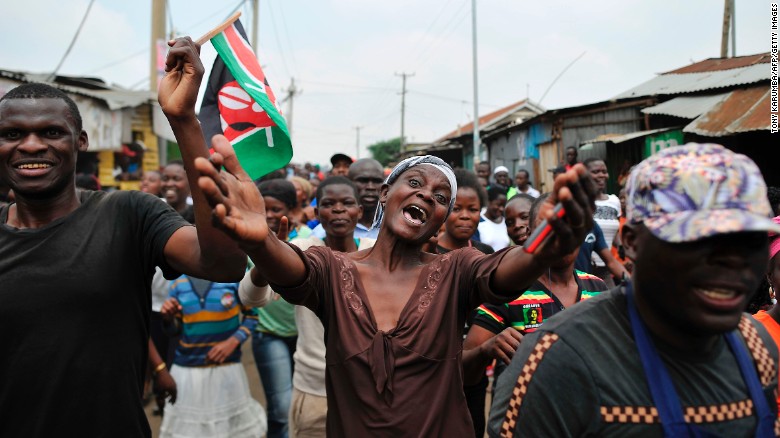Null and Void: Kenya’s Court Verdict on Presidential Election Dispute
by Chalachew Tadesse / October 4, 2017 / No comments

Odinga supporters celebrate after a Supreme Court decision which ruled the election “null and void.” Image via The Conversation.
A court nullifying the presidential election results of an incumbent president was unheard of in Africa until the Kenyan Supreme Court landmark verdict on September first.
International observers including John Kerry, co-leader of the Carter Center, were very quick to give Kenya’s August 8th parliamentary and presidential elections a clean bill of health, calling the elections free, fair, and credible. President Uhuru Kenyatta, who ran for re-election representing the ruling Jubilee Party, was declared winner by the Independent Election and Boundary Commission (IEBC). He was said to have garnered 54 percent of the votes leaving his rival Raila Odinga of the opposition, the National Super Alliance (NASA), at 44 percent.
Raila Odinga however, was quick to reject the result and threatened to take to the streets for mass action. Fearing a repeat of the 2013 court debacle, Odinga had initially ruled out the court option before changing his mind and filing a petition with the Supreme Court, challenging Kenyatta’s victory. Odinga’s lawyers battled it out in the courtroom, citing serious irregularities and illegalities during the electronic transmission of election results. In an unprecedented and historic move, a six-judge Supreme Court bench led by Justice David Maranga subsequently declared the election results “invalid, null and void”,” and ordered the IEBC to organize a fresh election. Later, the IEBC set the rerun for October 17.

- This column’s topics will include literature, art, education, history, and political culture in Ethiopia, as well as society and politics in the Horn of Africa. Moreover, I will address the tribulations of journalists and the ill-fated constitutional right of freedom of expression under Ethiopia’s deceptive authoritarian regime. I will try to be the voice of the voiceless, be it persecuted journalists at home or exiled journalists abroad. These themes will make Ethiopia’s uniqueness and absurdities evident.

- Chalachew Tadesse is an Ethiopian journalist and columnist. He has previously worked as a full time journalist for The Reporter and The Sub-Saharan Informer English newspapers. He was also a columnist for the much-acclaimed Fact magazine, before the Ethiopian regime closed it in October 2014. A political science student by training, he works as a university lecturer and is known for his sociopolitical commentaries on the Ethiopian private press.
The unprecedented and unexpected Supreme Court ruling caught Kenyans, presidential candidates, and international observers by surprise, because nowhere in Africa has a court nullified the election victory of a sitting president before. In fact, Kenya is only the the third country in the world to do so. There is no doubt that the court verdict is a big blow to President Kenyatta and his ruling Jubilee Party. However, in an unprecedented and courageous move, President Kenyatta publicly expressed his willingness to respect the verdict in its entirety, while at the same time strongly disagreeing with it. The court verdict and the president’s response to it mark a new chapter for Kenya and the rest of Africa.
Soon after the verdict however, Kenyatta lashed out at the Supreme Court judges in some strongly-worded remarks. In his infamous public remarks, he labeled the judges “thugs” and “crooks,” Accusing the court of staging a judicial coup against the will of the people, he also vowed to fix the court after the re-run: a reminder to Kenyans that state impunity won’t go away easily. At home and abroad, his remarks were widely condemned because they had potentially jeopardized the judiciary’s impartiality and integrity. Ironically, it was the President who urged his rival to take complaints to court instead of expressing them in violent protest.
In the light of Kenya’s 2007 electoral violence it could be speculated that Kenyans welcomed the recent verdict in order to prevent the country’s implosion. Had the court decided otherwise, without a doubt, the protestors of the opposition would have taken to the streets for mass action, clashing with security forces. The ruling reinforces the view that politicians should avoid shortcuts when resolving election disputes. Above all, the fact that Kenya passed this litmus test strengthens the judiciary’s independence, rule of law, and checks and balances. However, how long this will last remains to be seen.
The ruling has sent shockwaves to most of Africa’s authoritarian leaders who have been known for fraudulent elections, and has far-reaching ramifications on the courts of other African countries. Can African courts dealing with election disputes in the future ignore the precedent set by Kenya’s Supreme Court, without suffering from the associated moral and legal burdens imposed by it? Absolutely not!
Kenya is now in a state of political and legal storm. For now, all eyes are on the IEBC, which has been left in crises by the court ruling. Despite doubts from many Kenyans, the IEBC is assuring Kenyans it has the capacity and integrity to oversee the re-election.
One of IEBC’s headaches is that the court’s detailed justifications that were used to overturn the election have yet to come. Until then, how, where, and who bungled the election won’t be known for certain, meaning the polling agency may not be able to fix the problem.
Internal wrangling aside, the opposition is also IEBC’s worst nightmare. Emboldened and vindicated by the court verdict, the opposition (NASA) has put forward a list of demands to be met by the IEBC before the re-election. The demands from NASA include: a full audit of the IEBC electronic result transmission system and full access to IEBC computer server and the purge of some staff. In an attempt to restore confidence in the election process, the IEBC assembled a new election management team and agreed to open its servers to independent technology experts. However, neither of the parties seems to be satisfied with these compromises. Time is not on the side of the IEBC.
Worst of all, Mr Odinga is threatening to boycott the re-election unless his demands are heeded. Imagine what awaits the country should he follow through with the boycott. Kenya will no doubt be in uncharted and volatile waters. Political rhetoric aside, Odinga has seized the momentum to exert as much pressure on the IEBC as he can.
Over the course of two decades, Kenya has made several democratic gains including the 2010 democratic constitution. The effects of tribalism and patronage, however, still stand in the way of freely and fairly elected government and democratic governance. Public offices are typically perceived to be the sole sources of lucrative political and economic patronage. Office holders distribute state resources to familial/tribal kinships and close networks in an attempt to buy votes. Tribal loyalty, hate speech, and political intrigues heavily taint elections that are supposed to be based on merit. That is a sad state of affairs, one which Kenyan’s young democracy has yet to deal with!
In addition to this are several personal and familial factors.
Firstly, both candidates have long been locked in longstanding familial dynastic political feuds and tribal animosity. In the 1960s their fathers were political allies before they parted ways due to tribal differences and contradictory visions for the country, which resulted in Odinga’s father being pushed aside. The Lous believe that President Kenyatta stands for the status quo, so they rally behind Odinga to break the Kikuyu supremacy so to speak, be it a real or perceived hierarchy. The Lous feel resentment against what they see as deliberate marginalization and disfranchisement from national political and economic power by successive Kikuyu-dominated regimes, which in turn fuels the intense rivalry.
Secondly, this election is Kenyatta’s second and last term; he does not want to become a one-term president. In fact, it is uncommon in many African countries to vote incumbents out of office before their limited term of office expires. In contrast, Odinga lost three election bids already (he alleges his 2013 victory was stolen). This election may be Odinga’s last presidential bid.
Now both camps are back on the expensive and intense campaign trail that has unfortunately been underpinned by some toxic language. Political polarization underpinned by tribal divisions is sharpening by the day. However, tribe-based political realignments have been typical of Kenyan election seasons. Some questions still remain unanswered: will the Supreme Court’s order that the IEBC conduct free and fair election be heeded? Will the wounded IEBC be reformed, or give the opposition guarantees that it will carry out the re-election as ordered by the court? Will the two rivals be willing to concede defeat? Will Raila Odinga boycott the re-election, leaving the country in constitutional crisis?
Amid all fears, uncertainties, unanswered questions, and hopes, Kenyans are still ready to go to the polls once again. Surely, Kenyans are aware of the implication of this strong litmus test, which will determine the country’s destiny as a nation. Africa, and in fact the entire world, is keenly waiting to see which way Kenya will go. Kenya is once again on the spotlight.
For all these questions to be answered, we will have to wait for October 17.
Editor’s Note: This column was originally slated for publication in mid-September, however, technical issues delayed its publication until 4 October 2017.




